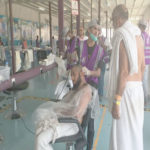
Contemporary urbanisation processes and rapid population growth in Sub Saharan Africa is increasing the vulnerability of urban dwellers, particularly the urban poor, to everyday hazards and disaster risks.
The distinct dynamics of changing urban forms, city governance, public financing and physical infrastructure and social services provision of African’s rapidly urbanising cities is closely connected to the construction and accumulation of risks.
The vulnerability of residents in Ibadan to different risks, its drivers and what risks should be prioritised forms the trust if a study tagged “Urban African Risk Knowledge” aimed at breaking cycles of risk accumulation in Sub Saharan Africa.
It was a three-year programme of research and capacity building that seeks to open up an applied research and policy agenda for risk management in urban sub-Saharan Africa. It is led by 12 policy and academic organisations from across sub-Saharan Africa, including the University of Ibadan.
The research on Ibadan involved a systematic collection of historical data on the spectrum of risks, including disasters and everyday hazards, resulting in illness, injury and premature death, property and economic losses in the city between 2000 and 2015
At the dissemination workshop of its findings, team leader of Urban Ark Ibadan, Dr Ibidun Adelekan stated that Ibadan residents are vulnerable to many different risks, saying road traffic accidents, crime, violence and flood in order of importance accounting for the largest number of premature deaths and injuries.
“These everyday hazards and small disasters we identified in the study have significant cumulative impacts on urban population and therefore require as much attention as large disasters such as floods,” she added.
The key drivers of vulnerability to urban risks in Ibadan, she said include city governance, inadequate public financing of social services, and regional planning and environmental developmental sectors, inequality in access to infrastructure and basic social services and increasing urban poverty and unemployment.
Dr Ibidun Adelekan, of the Department of Geography, University of Ibadan declared “efficient urban management and good urban management and good urban governance is key to reducing disaster risks and everyday hazard risks including public health risks and making cities safer.
“Poor urban planning, poor development control, weak building code regulation and enforcement has increased the vulnerability of large population of Ibadan habitants to various risks including the risk of floods, road traffic accidents, building collapse and fire hazards of different forms.”
According to her, risk reduction must prioritise public financing for the provision of infrastructure and basic social services citywide, and especially in areas occupied by the urban poor.
“Budget allocation to regional planning and environmental development consistently recorded the lowest allocation during a seven-year period spanning 200 to 2014. The sprawling nature of Ibadan city growth demands greater financial costs for the provision of adequate urban infrastructures and basic social services,” she declared.
Dr Adelekan suggested that it is critical that Ibadan city has a comprehensive and homogeneous database at the locality level to inform citywide risk profile, and to continue to update this that it might key into strategic planning in different sectors for risk reduction.
Achieving this, she said, will also require developing a coordinated approach for risk data generation and management that can be employed by relevant city departments, agencies and ministries.
In addition, an action plan for risk reduction, including reducing vulnerability to urban risks, she said must be deliberately and systematically integrated into short and long-term city development plans with goals for investment and financing clearly defined.
Professor Ezebunwa Nwockocha of the Department of Sociology, University of Ibadan, saying that Ibadan conjures a posture of ambivalence, distortions and inconsistency in development trajectories, said there was the need to enhance institutional and humanitarian responses to disasters in Ibadan.
Professor Nwockocha said studies show that common everyday hazards such as pollution, noise, congestion, improper solid waste disposal and diseases are largely ignored in the city even though they portend greater consequences for a large majority of its inhabitants.
These are people, he said, may not be able to readily link their effects to some immediate and long-term consequences such as an outbreak of a disease like cholera respiratory tract infections, injuries and physical disabilities from violent crime among others.
He said Urban ARK study findings indicated that response to disasters in Ibadan by institutions and agencies charged with that mandate has been grossly weak and as such impacted neighbourhoods inevitably resort to unorthodox approaches which have proved not effective in dealing with some of the events but also dangerous.
Another finding was that the socioeconomic, health, psychological and physical impacts of disasters in affected neighbourhoods and the city generally is huge and devastating.
None or the weak response to intensive disasters by state and city authorities is borne out of poor planning that pervades the Ibadan city governance landscape.
City administrators appear overwhelmed by the city’s persistently rising population profile and therefore unable to cope with the multifaceted challenges of urbanisation especially violent crimes.
Also, hazards and its impact varied across selected neighbourhoods, yet the narrative on response was largely similar and indicates an abdication of roles.
Professor Nwockocha, however, said this had proximate implications, adding that unless something is done urgently by stakeholders, breaking the cycle of risk accumulation in Ibadan city will remain a mirage.
“The challenges of response activities are further exacerbated by a persistently increasing population and sporadic physical expansion if the city that together, overwhelm the institutional capacity to act at critical moments.
“Of course, information is key to unpacking disaster response bottlenecks that relate to avoidable overlaps, dereliction of responsibility and difficulty in building synergies.”
Meanwhile, Dr Femi Olaniyan of the Department of Geography, University of Ibadan, said the studies finding indicate a critical need to reposition local governments for risk reduction activities.
He added that it is necessary to decentralise responsibilities and resources to local governments and give them the autonomy to manage disasters with minimal interference from the state government.
The transferred mandate to LGs through decentralised governance, he declared should provide them with the authority, responsibility and resources to make decisions and implement practical risk reduction actions.
What is more, he said there is the need for a multi-stakeholder platform to facilitate risk reduction activities at the local level with LEMA playing a central role in coordinating and sustain the platform.






